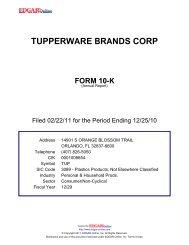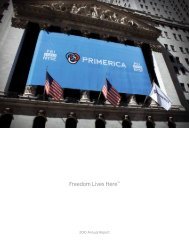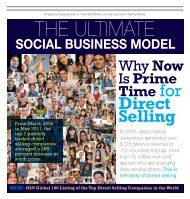Nu Skin 2010 Annual Report - Direct Selling News
Nu Skin 2010 Annual Report - Direct Selling News
Nu Skin 2010 Annual Report - Direct Selling News
Create successful ePaper yourself
Turn your PDF publications into a flip-book with our unique Google optimized e-Paper software.
ous markets, including Japan, South Korea, China, Europe, and the<br />
United Kingdom. From time to time, we receive formal and informal<br />
inquiries from various government regulatory authorities about our<br />
business and our compliance with local laws and regulations. For example,<br />
in 2009, we received notice from Belgium authorities alleging<br />
that we have violated the anti-pyramid regulations in that market and<br />
an inquiry from the Consumer Protection Agency in Hungary regarding<br />
various marketing claims. In the early 1990s, we entered into<br />
voluntary consent agreements with the FTC and a few state regulatory<br />
agencies relating to investigations of our distributors’ product<br />
claims and practices. Pursuant to the consent decrees, we agreed,<br />
among other things, to supplement our procedures to enforce our<br />
policies, to not allow distributors to make earnings representations<br />
without making additional disclosures relating to average earnings<br />
and to not make, or allow our distributors to make, product claims that<br />
were not substantiated. As a result of the previous investigations, the<br />
FTC makes inquiries from time to time regarding our compliance<br />
with applicable laws and regulations and our consent decree. If we are<br />
not able to resolve existing regulatory reviews to the satisfaction of<br />
the applicable governmental agencies, or there are any new regulatory<br />
challenges regarding our business or others in our industry, our<br />
business could be harmed if such actions result in the imposition of<br />
any fines or damages on our business, create adverse publicity, increase<br />
scrutiny of our industry, detrimentally affect our efforts to recruit<br />
or motivate distributors and attract customers, or interpret laws<br />
in a manner inconsistent with our current business practices.<br />
Challenges by third parties to the form of our business model or the<br />
actions of our company or distributors could harm our business.<br />
There have been private actions filed against some of our competitors<br />
in our industry in recent years by their distributors challenging<br />
the legality of their form of business. One of our largest competitors<br />
recently settled a class-action lawsuit, requiring it to pay a large cash<br />
settlement. There is a risk that such challenges and settlements could<br />
provide incentives for similar actions by distributors against us and<br />
other direct selling companies. Any challenges regarding us or others<br />
in our industry could harm our business if such challenges result in the<br />
imposition of any fines or damages on our business, create adverse<br />
publicity, increase scrutiny of our industry, detrimentally affect our efforts<br />
to recruit or motivate distributors and attract customers, or interpret<br />
laws in a manner inconsistent with our current business practices.<br />
Because legal and regulatory requirements concerning our<br />
industry involve a high level of subjectivity and are inherently fact-based<br />
and subject to judicial interpretation, we can provide no assurance that<br />
we would not be harmed by the application or interpretation of statutes<br />
or regulations governing network marketing in any civil challenge by<br />
a current or former distributor.<br />
Government regulations relating to the marketing and advertising<br />
of our products and services may restrict, inhibit or delay our ability<br />
to sell these products and harm our business.<br />
Our products and our related marketing and advertising efforts<br />
are subject to numerous domestic and foreign government agencies’<br />
and authorities’ laws and extensive regulations, which govern the ingredients<br />
and products that may be marketed without pre-market approval<br />
and/or registration as a drug and the claims that may be made<br />
regarding such products. Many of these laws and regulations involve a<br />
high level of subjectivity, are inherently fact-based and subject to interpretation,<br />
and vary significantly from market to market. These laws and<br />
regulations can limit the claims we can make regarding our products<br />
and often restrict our ability to introduce products or ingredients into<br />
one or more markets. In Europe for example, we are unable to market<br />
supplements that contain ingredients that were not marketed prior to<br />
May 1997 in Europe (“novel foods”) without going through an extensive<br />
registration and pre-market approval process. In addition, there has<br />
been increased regulatory scrutiny of nutritional supplements and marketing<br />
claims under existing and new regulations. At times these laws<br />
and regulations may prevent us from launching a product in a market,<br />
require us to reformulate a product or limit the claims made regarding<br />
a product. For example, as we prepare for the global launch of our new<br />
ageLOC nutritional product, we face regulatory issues that may force<br />
us to reformulate the product for some markets and may limit our ability<br />
to revise the product formulations without delaying necessary registrations.<br />
If these laws and regulations restrict, inhibit or delay our ability<br />
to introduce or market our products or limit the claims we are able<br />
to make regarding our products, our business may be harmed.<br />
During recent years, authorities’ enforcement activity and interpretation<br />
of these regulations suggest a greater allowance for scientific-based<br />
and substantiated claims when not involving specific drug or disease<br />
claims. As a result, as companies have developed new and innovative<br />
products, there has been a trend towards more aggressive claims and<br />
the inclusion of greater science regarding the marketing of cosmetic and<br />
nutritional products. We believe in order to remain competitive we need<br />
to have similarly compelling claims. Because there is a degree of subjectivity<br />
in determining whether marketing materials or statements constitute<br />
product claims and whether they involve improper drug claims, our<br />
claims and our interpretation of applicable regulations may be challenged,<br />
which could harm our business. This is a particular risk with respect to<br />
our ageLOC line of products based on our novel approach to these<br />
products and our focus on genes and sources of aging in both our scientific<br />
explanation for support of our products as well as our marketing<br />
claims. If regulators take a more restrictive stance regarding such claims,<br />
alter their enforcement priorities, or determine that any of our claims<br />
violate applicable regulations, we could be fined or forced to modify our<br />
claims or stop selling a product.<br />
19









